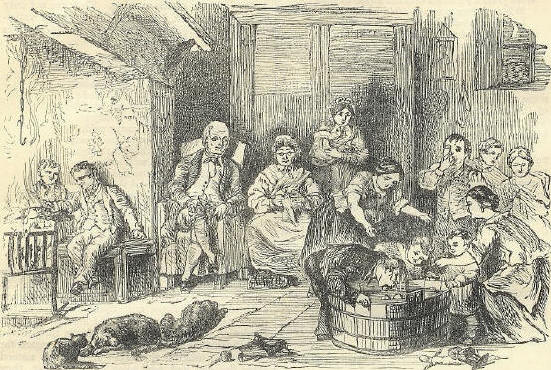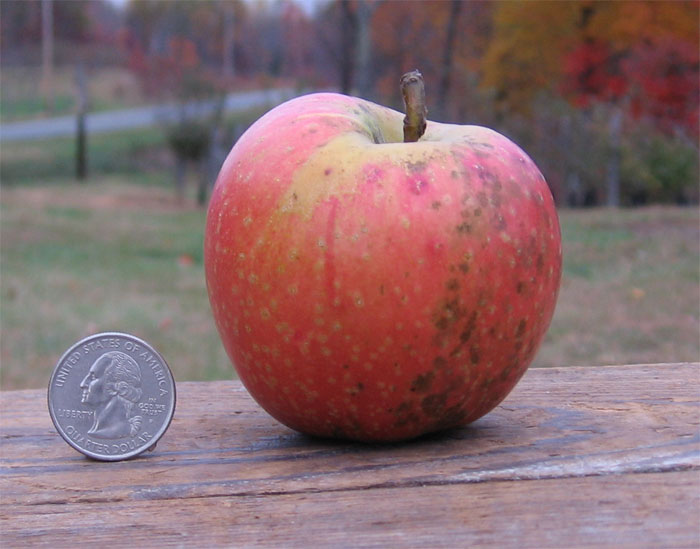The Blogging Farmer
Alex Tiller’s Blog on Agriculture and Farming***
The Ancient Rites
The only ‘magic’ these fall festivals were celebrating was the ‘magic that happened when someone put seeds into the ground and a few months later, came back to find they had produced something edible and tasty.Hallowe'en used to be just a fun holiday for kids, giving them an excuse to dress up as monsters, witches, ghosts, vampires, devils and even animals. In recent years however, some well-meaning people among the devout who let their dogmas run loose without a leash have started taking all the fun out of it, attributing it to "satanic" rituals and "dark magic."
Let me put Hallowe'en into some historic perspective—as well as a lot of other fall traditions. The only "magic" these fall festivals were celebrating was the "magic" that happened when someone put seeds into the ground and a few months later, came back to find they had produced something edible and tasty.
Bobbing for apples on HalloweenBefore the early Christian missionaries got hold of it and started calling it "All Hallow's Eve" (the day before the All Saints Feast on November 1st), October 31st was an old Celtic holiday known as Samhain (pronounced "SAW-one"—go figure). In its origins, this was the day that marked the end of the "light half" of the year when crops were planted and harvested and the beginning of the "dark half" of the year—when it was time to start storing the produce and getting ready for a long, cold winter.
Keep in mind that these ancient Celts were not necessarily scientific-minded people (though some claim the Druids were, but thanks to the Romans who pretty much wiped them out, there isn't a whole lot of evidence of what Druids believed). They weren't clear on the physical reasons for the seasonal changes, such as the tilt of the planet as it went around the sun. They only knew it happened.
Likewise, they didn't quite understand how a seed produced an edible plant or what made for a successful crop. In those days before scientific farming methods, agriculture could be an uncertain thing. Among other beliefs, these ancient Celts—whose descendants are the Irish, Scots, Welsh and Bretons—thought that on the night of Samhain, the spirits of the departed could reach out from the next world and bring blessings—or wreak nine kinds of havoc. Thus, the traditions of bonfires to welcome friendly spirits and wearing scary masks to scare off malevolent ghosts came about.
The Scots and Irish, whose descendants are the second-largest ethnic group in the U.S., brought these old traditions with them—though by then (after the mid-1600s), it was mainly for fun and celebrating a plentiful harvest.
Spitzenberg appleOne of the reasons I particularly like this time of year is that it's when the apple harvest comes in. It's just not worth eating apples in any other season, any more than a winter tomato is going to be any good at all. You're liable to find apple festivals all over the country this month as well as other kinds of fun activities that you're only going to find on the farm, such as corn mazes, hayrides and pumpkin patches (this is the time of year for them). This year, celebrate the fall by visiting your local pick-your-own apple orchard and taste what your missing (hint: red so-called "delicious" is barely worthy of the name—but you'll find some wonderful exotic varieties such as the spitzenberg, pacific rose and staymen winesap that will show you what a fresh apple is supposed to be).
Posted on November 3, 2010
***
Where The Jobs Are
So far, American agriculture has literally had to go begging to fill jobs.
Farm workers and Mt. Williamson (photo: Ansel Adams, Library of Congress)Yes, U.S. corporations have shipped almost 14 million jobs to China and India over the past nine years. The rate at which America is hemorrhaging jobs has slowed up considerably over the past eighteen months—but it hasn't stopped, and employment prospects for many Americans are looking pretty dismal. Except for one industry.
So far, American agriculture has literally had to go begging to fill jobs.
Despite all the rhetoric about how "illegals" are taking jobs away from American workers, the fact is that farmers and ranchers across the country have been bending over backwards in recent months to give those Americans first dibs on the jobs their offering. So, we're faced with a choice: either let that produce rot in the fields, or hire the folks who are actually applying for the jobs—in this case, immigrants from south of the border.
Here's what Garance Burke, a reporter for the Associated Press, had to say:
"...from January to June, California farmers posted ads for 1,160 farm worker positions open to U.S. citizens and legal residents. But only 233 people in those categories applied after learning of the jobs through unemployment offices in California, Texas, Nevada and Arizona."
Amazingly, out of over 40,000 farmers and ranchers in California alone, less than one-tenth of one percent applied for guest worker visas.
Now, nobody's arguing that farm work is darned difficult and demanding—and doesn't pay a whole lot (although in some areas they're paying over $10 an hour—a pittance if you're living in the big city, but not too bad for a lot of rural areas, and well over the federal minimum wage in any event).
Now, we know that Americans aren't lazy—heck, American workers put in longer hours for less pay and are more productive than anyone in the industrialized world. There are a few possible reasons why Americans, hard-pressed for jobs, aren't swarming out to the countryside, however.
One reason is travel; most of these farm jobs are not conveniently located. Another reason might be unemployment benefits, which could be affected—and in some cases, pay more than the job in question (by the way, contrary to what you're hearing from some candidates, unemployment is not an "entitlement" or a form of welfare—it's a form of insurance that workers pay into. Look at your pay stub next time and notice where they take money out of your check for this purpose).
Another biggie is the fact that farm work tends to be seasonal; folks who apply for a job usually want to start right away, not have to wait around for several weeks or months.
Those who are demanding that the U.S. crack down on illegal immigrants (who make up about half of the country's agricultural labor force) are now allied with the United Farm Workers union, stating that if farmers offered higher wages and benefits and better working conditions, more Americans would be willing to go to work on the farm.
What would this do to food prices? Economists aren't totally sure. The other problem is that farmers and most ranchers operate on a pretty slim profit margin to begin with.
Any ideas, here?
***
Memo
Re: Farm jobs go wanting
From: CNNMoney.comFarm workers: Take our jobs, please!
by Aaron Smith, staff writer
July 10, 2010: 1:14 PM ET
http://money.cnn.com/2010/07/07/news/economy/farm_worker_jobs/index.htmNEW YORK (CNNMoney.com) — Facing growing anti-immigrant rhetoric, the United Farm Workers union is challenging Americans to take their labor-intensive, low-paying farm jobs.
As communities nationwide grapple with tenacious unemployment, migrant workers are often accused of stealing jobs from Americans. The union believes this accusation is without basis, and intends to demonstrate this with a newly-launched campaign called "Take Our Jobs."
"Farm workers do the work that most Americans are not willing to do," said union president Arturo Rodriguez in the announcement of the campaign.
At least half a million applicants are needed to replace the immigrant workforce, so the union has posted an online application for Americans who want to work on a farm.
Through its Web site, at www.takeourjobs.org, the union promises to connect applicants with farm jobs in their area.
Since June 24, at least 4,000 people have responded to the application, said Rodriguez. Some are serious responses and others are hate mail. "Only a few dozen have really followed through with the process," he said.
Most applicants quickly lose interest once the reality sinks in that these are back-breaking jobs in triple-digit temperatures that pay minimum wage, usually without benefits, according to the union. Some small farms are not required to pay minimum wage and in 15 states farms aren't required to offer workers' compensation.
Despite the dismal job market in the U.S., where the unemployment rate is 9.5% and 14.6 million people are out of work, there have been few takers.
"I think everybody in our society is pretty clear that the least desirable job in the U.S. is being a migrant farm worker," said Rob Williams, director of the Migrant Farm Worker Justice Project. "If someone said to me, 'Here's a hazardous job and there's no worker's compensation,' I'd say, 'No thanks, It's kind of a no-brainer."
The Department of Agriculture counts nearly one million farm workers in the United States. According to the Migrant Farm Worker Justice Project, 85% of farm workers are immigrants—and up to 70% of them are illegal.
Rodriguez, the union president, said the campaign is meant to draw attention to the need for immigration reform, such as the so-called AgJobs bill currently held up in Congress. The bill would grant temporary legal status to immigrants, which would become permanent if they continue to work on farms for a specific period of time.
"If [members of Congress] can't do their job in passing the bill, then they should come work in the fields," he said.
Illegal workers are rich fodder for anti-immigration leaders such as Gov. Janice Brewer, R-Ariz., who told reporters in June that the "majority" of immigrants crossing the border from Mexico are smuggling drugs for cartels. The governor also signed into law requirements for state police to "determine the immigration status" of anyone under "reasonable suspicion" of being an illegal alien.
The Justice Department has sued the state of Arizona to overturn its new immigration law.
The proponents for migrant farm workers insist that they help, not hinder, the U.S.
Williams said that if people who oppose immigration "got their wish and all the unauthorized people went home tomorrow, we would have a crisis. We wouldn't have anyone to pick the crops, milk the cows, or take care of the Christmas trees."
He added, "It may be the least desirable job, but it's the most important job for all of us, because we all eat."
***
Employment Resources: Farm Jobs
PickingJobs.com
For seasonal jobs on farms around the worldAnywork Anywhere
Farm, fruit picking and packing jobs, plus a Jobs Guide to explain what the working conditions are like on each farmEcoForest
Small fruit farm in southern Spain that offers a place to live at low cost while changing to a healthy, sustainable way of life. They have a working visitor program, where work contributed subsidizes your keep. It is a vegan diet, all raw food.from the Emandal Farm website:
Why do people come here to work? We have found over the years that Emandal has been a great place for people to come while pondering life’s choices. Working a season or two on the farm is ideal for transitioning from one experience to another…whether the end of school, between jobs, prior to graduate education, before a trip around the world, or while making decisions about a career change.What sorts of jobs are available? We have a variety of positions available beginning as early as January, and a few more available in mid June. End dates vary depending on the position, though usually late September-mid October. Though we are a farm, we operate as a guest facility and the work reflects this. We encourage people to stay more than one season so they can experience the farm’s life cycle.
The website also lists current job openings.
Farm & Wilderness
Located in Vermont. Each year, nearly 300 staff members are hired for seasonal work (250 of them in the summer). Positions include camp counselors, senior support staff, activity heads, carpenters, cooks & kitchen staff, drivers, farmers, gardeners, maintenance workers, nurses, outdoor educators, special event coordinators and trip leaders. Work can seem like play in the camps because a cooperative group spirit enriches all the experiences of swimming and hiking, building and farming, dancing and music, crafts and cooking, and sharing thoughts and emotions. F&W also employs seasonal crew and interns throughout the year in the areas of organic farming, maintenance, carpentry and retreat coordination. Compensation includes a modest salary, housing and meals (mostly from fresh organic produce grown onsite!). Applications are reviewed on a rolling basis until all positions are filled.From the Farm & Wilderness website:
Farm & Wilderness offers a full range of employment opportunities. Our year-round administrative offices are home to an amazing team of hard-working people who spend all year running the F&W programs and operating the F&W farm and facilities. Occasionally we have Year-Round Job Openings and we seek dedicated, smart and well-rounded team-players. Take a look at our current Year-Round Employment postings.Each year, there are approximately 200 Summer Positions at Farm & Wilderness. These positions include camp counselors, camp program staff, lifeguards, drivers, cooks, health workers, maintenance workers and other camp support staff. Working at one of the F&W camps is a fun way to share your teaching and leadership skills; spend time outdoors in beautiful Vermont; and make a difference in kids' lives. We hire skilled and talented people who have experience with children and are committed to community. Visit our Summer Employment page for more information.
F&W offers Seasonal Farm, Facilities and Retreat Internships and Crew positions for people 21 and older who are seeking a more intensive community living and work experience. These work crews began in the early 1970s simply to insure that the buildings, grounds, animals, and gardens for the F&W summer camps were well maintained, improved and prepared for the following summer. Crew has evolved to have its own educational components and an emphasis on community building, leadership training and specific work apprenticeships. Visit our Seasonal Employment page for more information about F&W intern and crew positions.
For more listings of available farm jobs worldwide, visit PickYourOwn.org. Googling “Farm Jobs” will direct you to even more employment opportunities currently available on farms around the world.
***
Hello, and thanks for checking out my blog. My name is Alex Tiller and I grew up in rural Ohio (Clark County) where my family still owns farmland (corn and beans). I am a member of the American Society of Farm Managers and Rural Appraisers and am also an agribusiness author/blogger. I write about commercial farming, family farms, organic food production, sustainable agriculture, the local food movement, alternative renewable energy, hydroponics, agribusiness, farm entrepreneurship, and farm economics and farm policy. I visit lots of farms in different areas of the country (sometimes the world) that grow all kinds of different crops and share what I learn with you through this blog.
Founder/Publisher/Editor: David McGee
Contributing Editors: Billy Altman, Laura Fissinger, Christopher Hill, Derk Richardson
Logo Design: John Mendelsohn (www.johnmendelsohn.com)
Website Design: Kieran McGee (www.kieranmcgee.com)
Staff Photographers: Audrey Harrod (Louisville, KY; www.flickr.com/audreyharrod), Alicia Zappier (New York)
E-mail: thebluegrassspecial@gmail.com
Mailing Address: David McGee, 201 W. 85 St.—5B, New York, NY 10024










